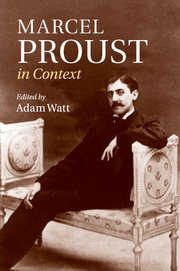Book contents
- Frontmatter
- Contents
- List of Illustrations
- Notes on contributors
- Figure I. Marcel Proust, portrait in oils by Jacques-Émile Blanche, 1892
- Preface
- Figure 2. Proust photographed on his death-bed by Man Ray, 1922
- Note on the text
- Chronology
- Part I Life and works
- Chapter 1 Life
- Chapter 2 Correspondence
- Chapter 3 Finding a form: Les Plaisirs et les jours to Contre Sainte-Beuve
- Chapter 4 Finding a voice: from Ruskin to the pastiches
- Chapter 5 Composition and publication of À la recherche du temps perdu
- Part II Historical and cultural contexts
- Part III Critical reception
- Further reading
- Index
- References
Chapter 2 - Correspondence
from Part I - Life and works
Published online by Cambridge University Press: 05 November 2013
- Frontmatter
- Contents
- List of Illustrations
- Notes on contributors
- Figure I. Marcel Proust, portrait in oils by Jacques-Émile Blanche, 1892
- Preface
- Figure 2. Proust photographed on his death-bed by Man Ray, 1922
- Note on the text
- Chronology
- Part I Life and works
- Chapter 1 Life
- Chapter 2 Correspondence
- Chapter 3 Finding a form: Les Plaisirs et les jours to Contre Sainte-Beuve
- Chapter 4 Finding a voice: from Ruskin to the pastiches
- Chapter 5 Composition and publication of À la recherche du temps perdu
- Part II Historical and cultural contexts
- Part III Critical reception
- Further reading
- Index
- References
Summary
When readers of À la recherche come to examine Proust's correspondence, they are struck by two contradictory facts: on one hand, the considerable size of the task taken on by the editors of the letters and, on the other, the perplexing issue of the importance that might be attributed to these documents. The most extensive edition of the correspondence, completed by Philip Kolb, consists of more than five thousand letters written between 1879 and 1922 by an author who, in the last years of his life, was a total recluse and capable of writing up to eighteen letters in one day. Thanks to this outstanding editorial achievement, the importance of Proust as a letter-writer has been proven beyond doubt. Although more letters or collections of letters come to light quite regularly from various sources (Kolb was of the opinion that he had discovered perhaps only one letter in twenty) the general basis for their publication is henceforth firmly established. On the other hand, the interpretation of the letters is an area that remains largely unexplored, representing for criticism as-yet-uncharted waters.
The publication of Proust’s letters
To some extent, the publication of the letters is partly called into question by a ban imposed by the author himself. On one occasion in January 1921, Proust was returning a letter to one of his female correspondents, and expressed in the broadest terms the wish that his letters should not be preserved: ‘I insist . . . that no correspondence written by me should be preserved, let alone published’ (Corr, xx, 35). Such a statement would have carried significant implications if the novelist had followed through his decision. When questioned by myself on the subject, Philip Kolb alluded to the account given by Proust’s governess, Céleste Albaret, according to whom a lawyer who was consulted on the matter said that the novelist did not have the right to dispose as he wished of any letters he had written.
- Type
- Chapter
- Information
- Marcel Proust in Context , pp. 10 - 18Publisher: Cambridge University PressPrint publication year: 2013



